- Home
- Farley Mowat
The Black Joke
The Black Joke Read online
Contents
Title Page
Dedication
1 The Spences and the Ship
2 A Merchant Makes a Plan
3 The Dark Clouds Lighten
4 Encounter with a Salmon
5 The Waiting Trap Is Sprung
6 The Land Sharks Snare a Ship
7 A Flight at Night
8 The High and Lonely Rock
9 The Basques Take Sides
10 The Men of Miquelon
11 Pierre Plots a Rescue
12 A Desperate Venture
13 The Battle for Black Joke
14 The Long Voyage Ends
Also by Farley Mowat
Copyright
For Sandy and David
who will someday sail
to Miquelon
1
The Spences and the Ship
ONE wind-whipped summer day in the year 1735, a black-hulled ship came storming in from seaward toward the mountain walls which guard the southern coast of Newfoundland. All the canvas she could carry was bent to her tall spars, and she was closing on the rock-ribbed coast at such a furious pace it seemed inevitable she must meet destruction in the surf that boiled and spouted at the foot of the sea-cliffs.
Just over the horizon astern of her a squadron of French men-of-war was straining to overhaul the fleeing ship. Aboard the Frenchmen a hundred cannon were primed and loaded, waiting for the moment when the massed fire of the squadron could rip the black ship into fragments.
The fleeing vessel, sardonically named Black Joke by her master, John Phillip, was one of the most notorious privateers in Atlantic waters, and for two years French merchant shipping bound for Canada had suffered her plundering. But on this summer day the vengeful French naval squadron had almost trapped her off the island of St. Pierre, and now she was running for her life.
In the waist of the privateer stood a young man named Jonathan Spence. Two months earlier he had been an ordinary seaman on an English ship which had crossed the Atlantic to fish on the cod-rich grounds of the eastern Newfoundland coast. Spence’s ship had been lying anchored in Acquaforte Harbour one day when the dawn light revealed the presence of a newcomer, a slim black vessel, lying across the narrow harbor entrance and commanding the anchored fishermen with her long brass cannon.
There was consternation in the fishing fleet as the officers recognized the infamous Black Joke. The captains had no alternative but to obey Phillip’s “request” that their crews be mustered on the decks. And they could do nothing but look on miserably as he addressed the crews, promising good wages and high adventure in his service.
Phillip’s audience was attentive. In those days the crews of fishing ships were little better than slaves. And so, when Phillip’s bully-boat rowed away from the fleet, it carried the pick of the young and able fishermen; and amongst them was young Spence.
Jonathan Spence enjoyed his service with Phillip even though it was a life of hard sailing and occasionally of hard fighting. But Jonathan had a great desire to be his own master. He had already fallen in love with Newfoundland, wild and formidable as it was with its great inland mountains, sea-racked shores, and dark spruce forests. And he had made up his mind to settle on the island, never to return to England where starvation and a serf’s lot awaited him.
But a settler’s life on the much-frequented eastern shores was a precarious business at best, for the owners and officers of the English fishing ships considered the settlers to be intruders into their fishing preserves and the conflict between the two groups was often bloody.
Things were different on the south coast of Newfoundland. Here the deep fiords and coves were so well protected by off-lying reefs and shoals that fishing vessels seldom ventured near them. Only a few men knew the secrets of that coast–and Captain John Phillip was one of them.
His knowledge served him well on the day Black Joke fled from the French squadron. He held Black Joke upon her course even though the green hands in his crew were sure he was taking them all to their deaths. The massive sea-cliffs seemed close enough to touch, when suddenly a cleft opened in the rock wall ahead. It was a mere slit in the face of the mountains, but the black ship drove unhesitatingly into it and in an instant had vanished from the face of the gray ocean.
The slit, no more than a hundred yards wide, twisted and turned between thousand-foot walls until it ended abruptly in an almost circular harbor, half a mile in diameter. The harbor looked rather like the crater of an extinct volcano, except that its floor was sunk under deep water and the steep surrounding slopes were clothed in forests. Tumbling down from the high rim were several bright rivers, and, almost in the center of the crater, were two small islets between which ships could moor in perfect safety from any wind that blew.
Even before Black Joke had dropped anchor, Jonathan Spence had decided that this secret place was where he would make his home.
Jonathan had worked well during his time with Phillip and so, after vainly trying to persuade the young man to stay with the ship, the pirate skipper granted his request that he be set ashore. Phillip also provided Jonathan with tools, arms, and ammunition, and with sufficient stores to support him through his first winter. Three days later Black Joke sailed, and Jonathan was left alone in the harbor which Phillip had named Ship Hole.
Black Joke returned in the following spring to find a well-built cabin on the shore of Ship Hole and a healthy but exceedingly lonely Jonathan Spence rowing anxiously out to greet the pirate ship.
Jonathan’s loneliness did not last long. A few days earlier Black Joke had captured a vessel bound for Quebec with a cargo of unwilling young women from France who were destined to become wives to the garrison soldiers in the citadel. The young women had begged Phillip to set them ashore in some free land and he had promised to take them to New England. But while the vessel lay in Ship Hole Jonathan caught the eye of one black-eyed lass who was ready and willing to join this sturdy young man in building a life in the Newfoundland wilderness. Phillip married the pair of them before he sailed, and from that day onward Ship Hole was never without the sound of human voices.
Two centuries after Ship Hole received its first inhabitants, a man who was Jonathan’s namesake stepped out into the spring sunshine from the doorway of a two-story frame house overlooking the harbor. This latter-day Jonathan Spence was a square-built man in his forties, ruddy-skinned, and with shaggy brown hair shadowing his deep-set blue eyes. He looked what he was–a man of the sea.
On this spring day he gazed out over a familiar scene. The sun came streaming down over the surrounding cliffs and glinted from the white-painted walls of a dozen almost identical wooden homes which straggled along the south slopes. Ship Hole stood revealed as a typical Newfoundland fishing village, with its handful of houses facing the waterfront; its small square church, and the more imposing and concentrated cluster of buildings and wharves belonging to the local merchant. There were no roads in Ship Hole or vehicles either. Narrow, twisting paths connected the various parts of the settlement; but the sea was the real highway, and the whole life of the inhabitants depended on the sea. It was to the sea that the Ship Hole men went for their livelihood, for they were all fishermen, and it was by the sea that the only communications with the outside world were maintained. Inland lay hundreds of miles of mountain plateau and caribou barrens across which only the local Micmac Indians could make their way.
It was to the sea that Jonathan Spence’s thoughts turned as he looked out toward the twin islets, between which a cluster of five schooners lay closely moored. They were two-masted fishing vessels; “laid-up” now, as they had been all winter, with their sailing gear stowed away on shore, so that they looked sleepy and abandoned in the bright spring sun. But there was one amongst them wh
ich stood out from her sisters as a ballerina would stand out in a crowd of folk dancers. Her slim, black-painted hull had a grace and delicacy which was unique amongst the rough-built, hard-working fishing ships. Although she was too far away for Jonathan to be able to read the name painted in gold along each bow, he knew it as well as his own. She was the Black Joke; and she belonged to him.
A vessel called Black Joke had belonged to each succeeding generation of Spences since the days when the first Jonathan came to Ship Hole in Phillip’s pirate ship, and into the present Black Joke had gone all the experience and knowledge gained from generations of seamen and shipwrights.
Work on her had begun six years earlier, when Jonathan and his brother Kent had gone far back into the country to search out the trees destined for her timbers. It had taken weeks to find the right trees, to fell them and limb them, and to roll the logs down to the nearest rivers. In the spring the two men had rafted the chosen logs and towed them out to the coast where a trading schooner had picked them up and brought them on to Ship Hole.
Since there was no sawmill to do the work, Jonathan and Kent had to shape the timbers by hand, using axes and adzes exactly as the first Jonathan Spence had done. Planks to sheathe the timbers, two inches thick, ten to fifteen feet long, and often a foot wide, had to be whip-sawed out of solid logs–also by hand.
All that summer the timbers and piles of planks were left to season, and the following autumn the ship began to build. She took shape on a piece of relatively level ground between the house and the beach. Day after day the two men worked with their shipwright’s tools, using only a hand-carved model of the ship for guide and plans.
They worked in any and every kind of weather; in bright sun, in snowstorms, and in blinding rain. By spring the frame was up and planked, and one fine day the ship was ready for the launch. The whole population of Ship Hole was on hand to watch and help as the wedges were knocked out from under her and she slid down wooden ways greased with rotted cod livers, and met the water with a mighty splash.
Among those who watched the launch, none was prouder than two small boys who shouted with enthusiasm when the vessel built by their two fathers rode off into the harbor as light and lovely as a gull. Peter Spence, who was Jonathan’s son, was so carried away that he ran heedlessly down the ways, slipped on the cod oil, and shot out into the water in the wake of the schooner as if he was also being launched. His companion and first cousin, Kye Spence, Kent’s only son, thereupon distinguished himself by throwing the first object he could find at Peter to help him keep afloat. Unfortunately the first thing he found was a stone net-weight. The stone was no help to the floundering Peter, but Kye’s action gave rise to such a burst of laughter from the onlookers that the lad rushed home in tears and hid in bed. Here he was shortly joined by a chastened Peter, half-drowned and half-frozen, and wrapped in so many woolen petticoats belonging to his mother that he looked more like a rag doll than like a boy.
The launching of Black Joke was something the two children would remember all their lives. It was a lucky launching, and luck was with the ship.
When she had been fitted out and rigged, she sailed from Ship Hole with Jonathan as master and Kent as mate, and with a crew of four other local fishermen. She made her first fishing voyage to the far-off coasts of Labrador, and she was gone three months. When she returned, it was with a full cargo of salt cod in her hold. She had made a “bumper voyage.” She had also proved herself to be one of the best and ablest sailers in the entire Labrador fishing fleet which numbered several hundred schooners.
The following year the brothers sailed her far out in the Atlantic to fish on the Grand Banks. Here she showed her worth to some of the best fishing vessels in the world, the big Banks schooners out of Gloucester and Lunenburg. Small as she was–she was only 80 tons as compared to the 200-ton Yankee and Canadian Bankers–she was able to carry sail in weather which forced the bigger ships to heave-to, and if there was another ship on the Banks that year who could catch her when she had a favoring breeze, Black Joke never met her.
On her first two voyages she made a considerable local reputation as a fast and lucky ship, but on her third voyage she made a name for herself right across the Atlantic. During the autumn of her third year afloat she made a charter voyage from St. John’s, the capital of Newfoundland, to Oporto in Portugal with a full cargo of dried cod. Sailed by her two owners and a four-man crew, she made the passage clean across the western ocean in twelve days–a time not many big steamships could easily surpass. It was a passage that old John Phillip himself would have envied, and it made Black Joke’s name famous wherever sailing men got together.
As Jonathan looked across the harbor at her on this fine spring day, he should have been happy, but in fact he was deeply troubled. The great depression of the ’30’s was in full swing, and hard times had come to Newfoundland. Though the seas were still full of codfish, markets and money seemed to have vanished. Fishermen could hardly give away their catch, let alone sell it. In every outport it was the same story–near starvation, and growing debts to the local merchants upon whom the fishermen were dependent for the miserable rations of flour, molasses, and tea which had now become their staple diet.
Few of the merchants were generous men, and fewer still believed in charity. In Ship Hole four of the five schooners belonging to the place had already passed into the hands of the local merchant, Simon Barnes, as part payment of their ex-owner’s debts. Black Joke still remained free because the Spences had always fought shy of the merchant. The Spences had always paid their own way, for they had seen how easy it was to fall into debt to the merchant for food, clothing, or for fishing gear–and how difficult it was to escape again. They had observed that many outport people eventually came to be working for the merchant rather than for themselves.
Consequently, the Spence family bought little from Barnes, and sold even less to him. They preferred the adventurous alternative of sailing to St. John’s each autumn with their summer catch of cod and selling it there. When they sailed home again, they would bring with them most of the supplies they would need in the year ahead.
The independence of the Spences did not endear them to Simon Barnes. Not only was he unable to make a profit on them, but their example was a dangerous one, for it tended to spread to other fishing families.
Jonathan knew perfectly well how Barnes felt, and he was worried. Ever since his brother Kent had been lost at sea during the annual seal hunt two years earlier, Jonathan had been hard put to keep things going. Black Joke was still free of debt, but Jonathan knew that unless he could find work for her, work that would bring in cash money, he would eventually lose her. He had thought of making a voyage to Labrador or to the Banks fishery–but what was the use of that when he would be unable to sell his fish for even enough to pay the cost of grub for his crew? He had thought of risking Black Joke in a voyage to the ice after seals, but the loss of his brother in a vessel even larger than Black Joke made him realize that this would be too foolhardy a venture. For a time he had hoped to be able to charter the ship to one of the big St. John’s fish merchants for a spring voyage to carry salt cod to the Caribbean. With her reputation for fast sailing, she ought to have had no trouble finding charters; but merchants stick together, and Barnes had persuaded the merchants in St. John’s not to give Black Joke an opportunity.
Jonathan was still staring at his ship, and puzzling over her future–and his own–when the door behind him swung open and he was almost bowled over as the two boys of the household, Peter and Kye, came bursting through the doorway wrestling fiercely with one another. Quick as a cat, Jonathan recovered himself and with one swift lunge grabbed each boy by the back of his homespun jersey.
They were an oddly assorted pair. Peter was lean and lanky with a wild mop of sandy hair and piercing blue eyes. His face was crimson with wind and sun, except for a thick band of freckles across his nose and cheekbones. By nature he was an enthusiast, often reckless, and usually heedle
ss of the troubles he was storing up for himself.
Kye was of a different build: heavy-set and chunky with lank black hair and a face as brown and round as that of an Indian, which was not surprising, for his mother, who had died when he was born, had been a Micmac from the nearby Indian settlement of Conne River. Kye was of a different nature from his cousin, tending to be more stolid and cautious, though he had a droll wit and an easy and engaging smile.
“By the Harry,” Jonathan said when the lads had stopped struggling. “Is it bear cubs I have in this house–or b’ys? Answer me, ye whelps, or I’ll skin ye and find out!”
He gave them both an affectionate shake that almost loosened their heads from their shoulders. Still panting, Peter wriggled in his father’s heavy grasp.
“Leave be, sorr, please,” he begged. “ ’Twas just that Kye said Black Joke would have the dry rot afore we ever got around to givin’ her an overhaul, and I told him ’twas he had the dry rot–in his head!”
Jonathan chuckled and released them. They stood before him looking sheepish. Good sturdy lads for their years, he thought to himself. It’s a sad thing that Kent can’t see his own boy now.
“Well, ye meant nothin’ by it, Kye,” he said aloud. “And ye may not be so far off the mark. The truth of it is I can see nothin’ for the ship to do; no work at all. Still…that’s no reason to neglect her. And broodin’ and thinkin’ won’t keep her fit. It’s past time we turned-to and got her into shape. Come on then, ye pair of connors! Down to the stage with ye and we’ll do some proper work.”
2
A Merchant Makes a Plan
FOLLOWED by the boys, Jonathan picked his way down the path toward the shore. It wound steeply between immense gray boulders that had scaled off the surrounding cliffs in ages past.
Each family owned its own stretch of beach from which the business of the cod fishery was conducted. A rough shanty, called the “fish store” or simply the “store,” stood near high-tide mark and contained fishing and sailing gear, supplies of salt for making salt cod and, in season, piles of dry salt fish ready for market. Laid out haphazardly to shoreward of the stores were the drying flakes: flimsy platforms of spruce poles covered with boughs. On these the split, salted cod were laid to dry and cure during the warm summer days. Poking out into the harbor from each store was a rough-built dock of small logs decked with spruce poles. This was the “stage,” where the fish were landed and where the men and boys gutted and split them.

 Owls in the Family
Owls in the Family A Whale for the Killing
A Whale for the Killing Sea of Slaughter
Sea of Slaughter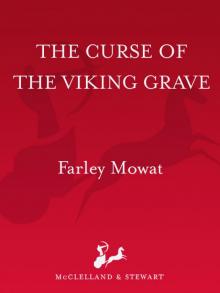 The Curse of the Viking Grave
The Curse of the Viking Grave The Boat Who Wouldn't Float
The Boat Who Wouldn't Float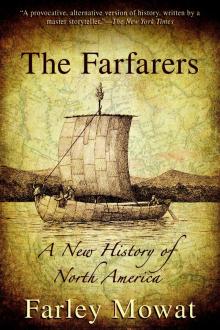 The Farfarers: Before the Norse
The Farfarers: Before the Norse Memoir
Memoir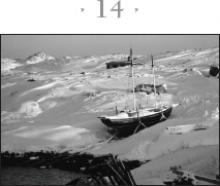 Bay of Spirits: A Love Story
Bay of Spirits: A Love Story The Black Joke
The Black Joke Sibir: My Discovery of Siberia
Sibir: My Discovery of Siberia The Dog Who Wouldn't Be
The Dog Who Wouldn't Be Never Cry Wolf
Never Cry Wolf And No Birds Sang
And No Birds Sang The Snow Walker
The Snow Walker Born Naked: The Early Adventures of the Author of Never Cry Wolf
Born Naked: The Early Adventures of the Author of Never Cry Wolf Otherwise
Otherwise Lost in the Barrens
Lost in the Barrens Gorillas in the Mist
Gorillas in the Mist People of the Deer
People of the Deer Eastern Passage
Eastern Passage Sibir
Sibir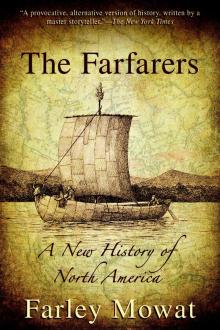 The Farfarers
The Farfarers A Whale For The Killing (v5.0)
A Whale For The Killing (v5.0)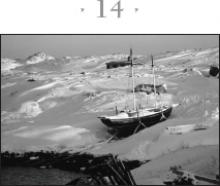 Bay of Spirits
Bay of Spirits And No Birds Sang (v5.0)
And No Birds Sang (v5.0) Born Naked
Born Naked